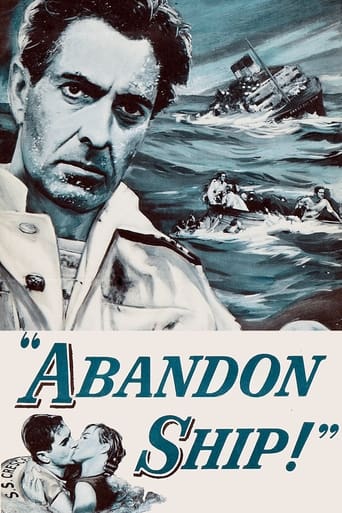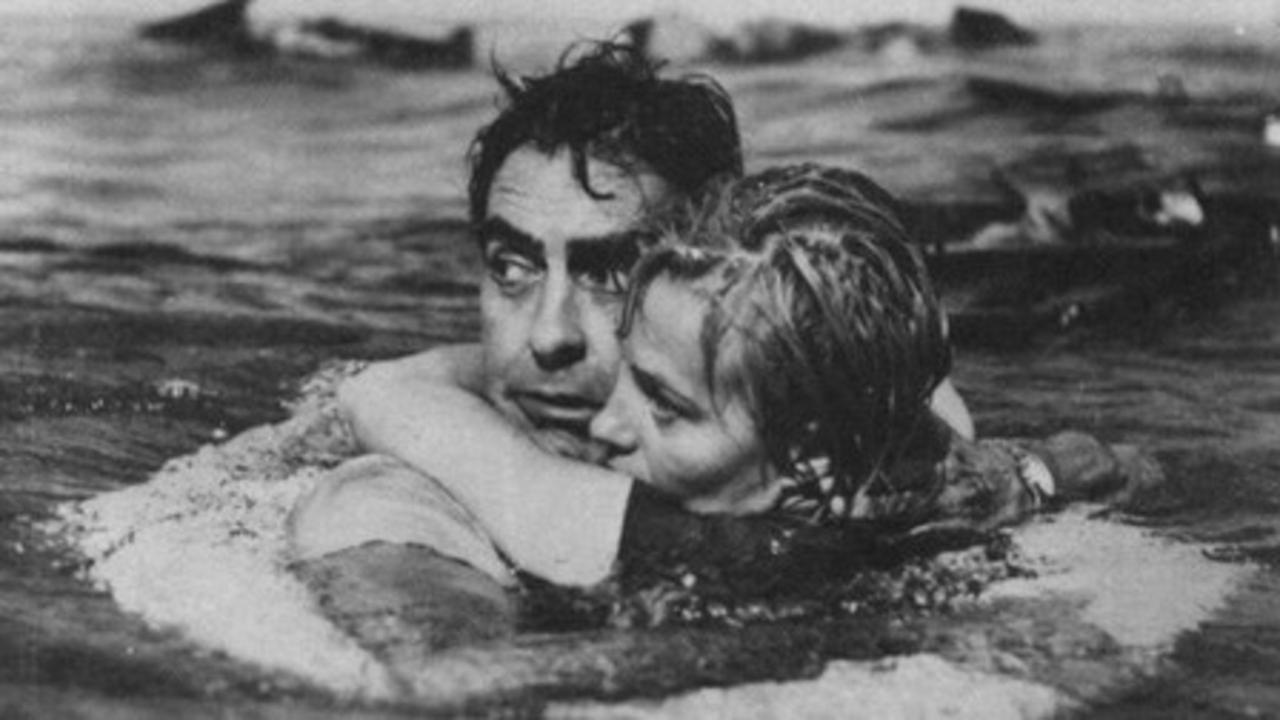Tracy Winters
I don't care if it's true that passengers in the lifeboat from the sunken ship 'William Brown' in this supposed 'true-story' film were thrown overboard so that some of the other passengers may live. If that's how it happened in real life, then the perpetrators got it DEAD WRONG.They missed the whole point of humanity, and so did the lame 'captain' in this movie, being weakly portrayed here by Tyrone Power. Ironically, this may be his best role since he's directed to be a martyr instead of a smiling hero. Then again, ANYBODY can appear to be a 'good actor' if they just frown the whole time.Nope..... sorry folks. It was an abomination of human spirit that made people sacrifice the lives of others so that 'at least a few others' could live. They got it WRONG, and so did you if you think you have the right to decide who's going to live and who's going to die. Check your brains..... if you have any.
dougdoepke
No need to recap the much-repeated plot. I'm not sure which came first— this movie or the "Lifeboat Paradox" used as illustration in many college courses in ethics. What the lifeboat situation sets up so starkly is the clash between two prevalent theories of right and wrong. These two are worth taking a brief look at since their conflict makes up the crux of this intense melodrama. Ty Power ends up opting for a Utilitarian standard where the aim of correct conduct is to bring about the greatest good for the greatest number of people. This standard okays sacrificing some in order to save others in circumstances where all other alternatives would result in less 'good' for a fewer number of people. Under the desperate circumstances, Power is approximating that standard by sacrificing those least likely to survive in order to save those most likely to survive, while the 'good' to be maximized is individual survival. The classic objection to this theory is that it can justify sacrificing the innocent in order to bring about a 'greater good', whatever good or value that might be. Here the weak and the injured are cast adrift through no fault of their own, and it's this aspect that's so repugnant to ordinary sensibilities, such as the professor's. But, it's well to keep in mind that a Utilitarian standard is used all the time when making life-and-death decisions in wartime. So-called "collateral damage", for example, amounts to a rough utilitarian calculus applied during bombing campaigns where civilian casualties are inevitable. What's so unnerving in the movie is that unlike bombing campaigns we can put names and faces on those sacrificed, which is why Power is advised not to get too familiar with the others.This utilitarian theory conflicts with a second theory, the more conventional Egalitarian standard, which holds that all human life is of equal value. On a strict application of equality, no person should be sacrificed for the benefit of another, and when human life is held as the supreme value, some version of pacifism would appear the logical conclusion. Without viewing the film a second time, Stephen Boyd's character, I believe, comes closest to acting out a consistent Egalitarian standard since he refuses to sacrifice another without sacrificing himself. (In passing—Moira Lister's sardonic young woman appears to admire Power's strength of character simply for his strength and not for whether he's made the morally right decision. Suggesting that strength of character is in some sense more basic than right and wrong points toward the amoralism of the German philosopher Friedrich Nietzsche.)Anyway, the survivors, including Power, begin the ordeal by holding to presumably some conventional form of egalitarianism. But under the pressure of circumstance, they give in to Power's conversion to a utilitarian view of the situation. However, when rescue comes and the pressure is off, they revert back to convention, leaving Power to take the heat and deal with the law. This suggests that Power may end up being something of a martyr to their survival. After all, the law, at least as we proclaim it, reflects an egalitarian standard (everyone is equal before the law), and on that basis Power is guilty in some sense of a crime since he has valued some lives over that of others. Nonetheless, has Power done anything more blameworthy than, say, a bomber pilot who kills x-number of civilians in utilitarian pursuit of the greater good of winning the war. We pin medals on the latter, but the former, we're informed, was jailed for six months.I suspect the movie is correct in suggesting that under normal circumstances people identify with the more idealistic equality standard. But in severe conditions, we're likely drawn in a more pragmatic utilitarian direction. Nonetheless, the two really do clash at a fairly basic level. Whatever one's opinion on these matters, the film dramatizes the academic issues pretty effectively.The movie itself offers little relief from the dire predicament the survivors are in. It's pretty much 90 minutes of harrowing grimness. I can't imagine the contents made money, at the same time I think it's a tribute to the producers that the film got made at all. As sheer entertainment, the film's value may be questionable, but as a prompt for getting audiences to think about questions of right and wrong, I believe it succeeds admirably.
JasparLamarCrabb
After a ship hits a mine and sinks, officer Tyrone Power is forced to take command of a lifeboat and decide who gets to live and who gets left behind. His decision to lighten the lifeboat and save those he can is, of course, met with full on rejection by the other survivors. Though featuring a large cast, this is not an all-star disaster movie. It's much more of a nail-biter than anything else. Director Richard Sale's tightly wound film proposes a real moral dilemma (what would YOU do?). Power is perfect for this role...he's very stoic and very commanding and the supporting cast, including Bergman star Mai Zetterling is terrific. Lloyd Nolan is excellent as a fellow officer and Stephen Boyd, in an early role, is very good as one of Power's subordinates who realizes that obedience to authority is not that easy. Moira Lister plays a catty party girl (perhaps a tip of the hat to Bankhead in Hitchock's LIFEBOAT?). An odd, exciting film.
MartinHafer
The film begins with an explosion that quickly sinks an ocean liner. Apparently an old WWI or WWII floating mine struck the vessel and very few people have survived. One group of survivors consists of 27 people inside as well as clinging to a dingy only meant to hold 9! Because it is totally overloaded, the passengers need to take shifts in the water--wearing life jackets and holding on to ropes. Despite this arrangement, there simply isn't enough food or water and once the weather changes the boat will no doubt capsize since it is so low in the water. Because of this, eventually the man in charge (Tyrone Power) is forced to start abandoning the weaker survivors--reasoning that SOME might survive that way. But because the parts of the weak are fleshed out in the story, it is very hard to see them cast adrift one by one--it's tough to watch and very frightful. While this does make this a good movie in some ways due to its addressing a serious moral dilemma, it's horrid to watch and not at all pleasant. It really takes an unusual person to want to see this film.Technically, this is a decent film though the explosion at the beginning of the film was super-cheesy and cheap looking. Despite good writing, direction and acting, though, this movie is NOT for most people, as it's very gritty and super-depressing throughout. Because of this I am advising any potential viewers to think twice about seeing it--even though the film is in some ways quite amazing.For a more enjoyable but certainly less realistic view of the subject, try watching Hitchcock's film, LIFEBOAT. It's very stagy and more trivial than SEVEN WAVES AWAY but at least it's not as depressing.


 AD
AD



